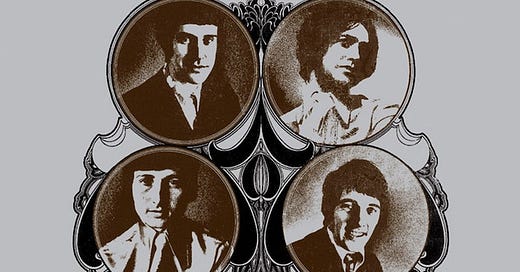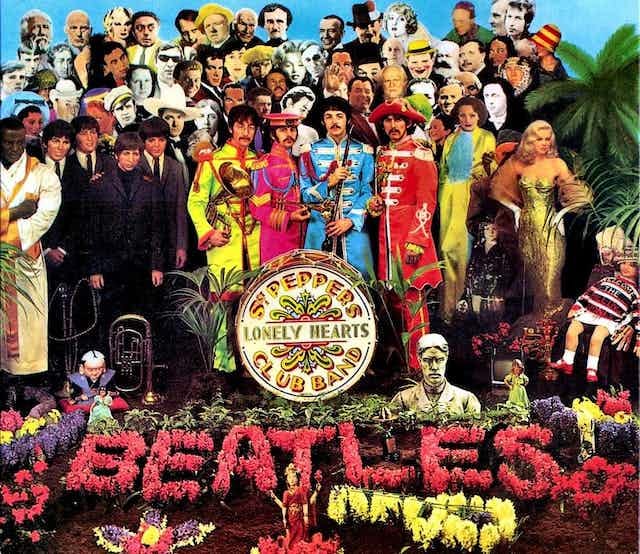In the annals of rock and pop history, few songs evoke the mood of a time and place as vividly as ‘Waterloo Sunset’ by The Kinks. Released in 1967 on the album Something Else, this iconic song has transcended its origins to become a timeless classic. It serves as the last track on the album, sealing it with a sense of emotional completeness and geographic specificity that continues to resonate.
That geography is important; the area around Waterloo in London contains some of my favourite locations in the UK’s capital. From the London Eye, the BFI Southbank and IMAX Cinema, Tattershall Castle, The Globe, The Tate Modern, The OXO Tower and The Southbank Centre. These are places in which I’ve spent countless hours with friends, colleagues and family. Hours looking at artwork, eating, drinking in the sun, watching films on screens small and enormous, as well as getting on and off boats and trains at sunrise and sunset with people I love. It was the first busy place I went with family as society opened up after the pandemic lockdowns.
Love does feature prominently and resoundingly on ‘Waterloo Sunset’. Where other tracks on Something Else delve into social critique, envy, melancholy, smoking, unemployment and whimsey, ‘Waterloo Sunset’ manages to capture the simple, everyday beauty of a moment in time, making it stand out as a more optimistic and universally relatable closer on an album filled with more personal or darker themes. It is a masterpiece, one of the best songs of the 1960s, and arguably the most revered track we’ve looked at, except ‘A Day In The Life’.
4,000 holes in Blackburn, Lancashire
It is always essential to have a sense of perspective when writing these. Some of the tracks we have looked at have been lightweight, and there’s very little written on them because there’s very little to write about. So, if I knew nothing about this next song, which would be tricky, some quotes about it would be pretty off-putting.
The song bridges the ordinary and the transcendent, weaving the mundane details of Waterloo station—which has never been a picturesque train station like London St. Pancras or New York’s Grand Central Terminal —with evocative imagery that seems to hold its own in the cosmos. Far from mere sentimental gloss, it showcases an everyday beauty that captivates and enriches the soul without resorting to melodramatic excesses or corny cliches.
Ray Davies, the man behind The Kinks, found his sanctuary in a semi-detached house at 87 Fortis Green in North London. It was within these walls that ‘Waterloo Sunset’ was born. The song encapsulates the feeling of loneliness, detachment, and an unquestionable comfort in finding beauty within the chaos. The song lyrics turn Waterloo, a bustling urban area in London, into a “sacred” spot.
Davies told Nick Halsten in 2011 that the song recalled fragile memories from his past;
I didn't think to make it about Waterloo1, initially, … But I realised the place was so very significant in my life. I was in St Thomas' Hospital when I was really ill [when he had a tracheotomy aged 13], and the nurses would wheel me out on the balcony to look at the river. It was also about being taken down to the [1951] Festival of Britain with my mum and dad. It's about the two characters in the song, and the aspirations of my sisters' generation before me, who grew up during the Second World War. It's about the world I wanted them to have. That, and then walking by the Thames with my first wife2, and all the dreams that we had. Her in her brown suede coat that she wore, that was stolen.
Even if the lyrics elude you, the emotional state of the song's narrator comes through clearly. He's a solitary, emotionally bruised figure who finds the outside world intimidating—overwhelmed by the restless Thames and the crowds that congregate like a swarm of flies around the Waterloo Tube station. Even the bite of the spring air feels too confrontational for him. Instead, he finds solace in observing young lovers Terry and Julie and the mesmerising hues of the sunset from the safety of his window. As he utters, "And I don't feel afraid," he clings to this peaceful panorama as his sanctuary. The song's ability to provide this emotional respite is part of its healing power for listeners.
Ray Davies once reviewed Revolver, and it is telling that ‘I’m Only Sleeping’, and its subject matter, which involves watching life from a distance, is the only song he was on board with.3
The song showcases Terry and June, considered stand-ins for Terence Stamp and Julie Christie, lovers in the 1967 film Far From the Madding Crowd. Ray Davies revealed that the names were placeholders. He even considered using "Bernard and Dorothy" initially. Davies has since described it as a fantasy involving his sister, who emigrated to Australia, symbolising a desire for a new and better world.
The bass, handled by Pete Quaife, complements Dave Davies’s guitar by providing a rich undercurrent that moves the song along without overwhelming it. Given the subject matter, it isn’t possible to hear it without thinking about the gentle lapping sound of the Thames against the many vessels that rest on her. The drumming from Mick Avory mirrors this: understated, avoiding bombastic rhythms or fills, and instead, providing a gentle cadence that enhances the song's reflective mood.
This all comes together so the song brings out an emotional quality similar to what one might experience while standing at a picturesque train station or other public place that evokes a strong sense of place and time, offering travellers or passersby a moment to pause and reflect, similar to the contemplative experience ‘Waterloo Sunset’ offers its listeners.
Ray Davies’ ability to capture this sense of place and emotion in the song and the locale makes ‘Waterloo Sunset’ relatable to many of us. It's more than a London folk song or pop record; it's a song about the human condition, finding beauty amidst chaos, and the transformative power of places, memories, and music. After what we all went through, together, at the start of the decade, I implore you to go out and breathe in your own Waterloo Sunset.
The song was first written about Liverpool until The Beatles released ‘Penny Lane’ / ‘Strawberry Fields Forever’ early in 1967.
His first wife, Rasa Didzpetris, provided the ethereal backing vocals of the song.







Waterloo is a special place. Loved the photo, the shared memories and the song background. Brought back a lot of memories for me in different ways.
There aren't many songs that are both of their time and timeless. Also, you could change Waterloo to any location that means something to you personally and it would still work.